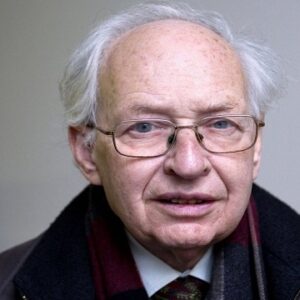Reinhard Selten is a German economist who shared a Nobel Prize in Economic Sciences in 1994. He is best known for his work in limited rationality, but he also contributed significantly to the development of game theory. He also established the BonnEconLab (Laboratory for Experimental Economics) at the University of Bonn, and is regarded as one of the pioneers of experimental economics. He was born in 1930 in Breslau (Wrocaw), Germany (now Poland), and grew up during a turbulent moment in European history. He had a difficult childhood and adolescence while growing up under the Nazi government. He did, however, survive World War II, unlike many of his relatives who perished in the Holocaust, and went on to rebuild his life. He studied mathematics at the University of Frankfurt and spent a few years working as a research assistant to Heinz Sauermann. He refined the significant economic notion of the Nash equilibrium, which had been proposed by the eminent mathematician John Nash, due to his great interest in game theory. Selten devised the “subgame perfect equilibrium” while working on the concept and discussed his hypothesis with economist John Harsanyi. Nash, Selten, and Harsanyi were awarded the Nobel Memorial Prize in Economic Sciences in 1994 for their combined work.
Childhood and Adolescence
Reinhard Justus Reginald Selten was born on October 5, 1930, to Adolf Selten and Käthe Luther in Breslau (Wrocaw), then in Germany (now in Poland).
His father was Jewish, though he did not identify with any religious group, and his mother was a protestant. Due to the current political climate in Europe, which was increasingly anti-Semitic, the boy was baptized as a protestant.
With World War II looming huge on the horizon, he grew up in a highly charged society. He witnessed the destruction of the town he grew up in and the deaths of many of his family after the war broke out. His father grew extremely ill and died in 1942, adding to the family’s hardships.
Being a half-Jewish boy during Hitler’s reign was a harrowing experience for the young adolescent. He was forced to drop out of high school at the age of 14 and was denied the opportunity to study a trade.
Fortunately, he and his mother and siblings were able to flee Breslau as refugees, first to Saxonia, then to Austria, and eventually to Hessia.
In 1947, the family relocated to Melsungen, a tiny town where he graduated from high school in 1951. He had a keen interest in mathematics throughout these years. He had also developed an interest in politics by this time.
He received his master’s degree in mathematics from the University of Frankfurt between 1951 and 1957.
The Career of Reinhard
Professor Heinz Sauermann, a professor at the University of Frankfurt, engaged Reinhard Selten as his research assistant in 1957.
He did the research for the Deutsche Forschungsgemeinschaft, Germany’s equivalent of the National Science Foundation, under Sauermann’s supervision.
Originally, he intended to apply decision theory to firm theory, but he became increasingly concerned with economic laboratory testing instead. Because experimental economics as a field did not yet exist at the time, Selten became one of the field’s founding fathers.
‘Ein Oligopolexperiment’ was the title of a journal article he co-authored with Sauermann in 1959. (an oligopoly experiment). His work on the evaluation of n-person games earned him a Ph.D. in mathematics in 1961.
He conducted a series of tests on an oligopoly game with demand inertia in the early 1960s. He defined subgame perfectness during his studies and presented his findings in the publication ‘Ein Oligopolmodell it Nachfrageträgheit’ (An Oligopoly Model with Demand Inertia) in 1965.
He earned his postdoctoral degree (Habilitation) in economics in 1968. He was a full professor of economics at the Free University of Berlin from 1969 to 1972 before going to the University of Bielefeld in 1972.
He made a lot of progress throughout his time at Bielefeld. In a paper published in 1975, he expanded on his work in game theory by defining a refined definition of perfectness—now known as trembling hand perfectness.
In 1984, he became a professor of economics at the University of Bonn, where he established the BonnEconLab, a laboratory for experimental economic research.
In 1996, he was promoted to professor emeritus and scientific coordinator. He is also a member of the International Academy of Sciences San Marino, which he co-founded.
Reinhard Major Projects
Reinhard Selten is a game theory specialist who is credited with introducing the subgame perfect equilibrium solution notion, which developed the Nash equilibrium further. He also provided perfect equilibrium to the trembling hand, which is a refinement of Nash equilibrium.
He was a key player in the development of experimental economics, which is the study of economic problems using experimental methods.
Experiments are used in this field of study to better understand how and why markets and other exchange systems work the way they do. Understanding institutions and the law is also part of it (experimental law and economics).
Achievements & Awards
In 1994, the Sveriges Riksbank Prize in Economic Sciences in Memory of Alfred Nobel was presented to Reinhard Selten, John C. Harsanyi, and John F. Nash Jr. for “their pioneering investigation of equilibria in the theory of non-cooperative games.”
Personal History and Legacy
In 1959, he married Elisabeth Langreiner. They are not the parents of any children.


